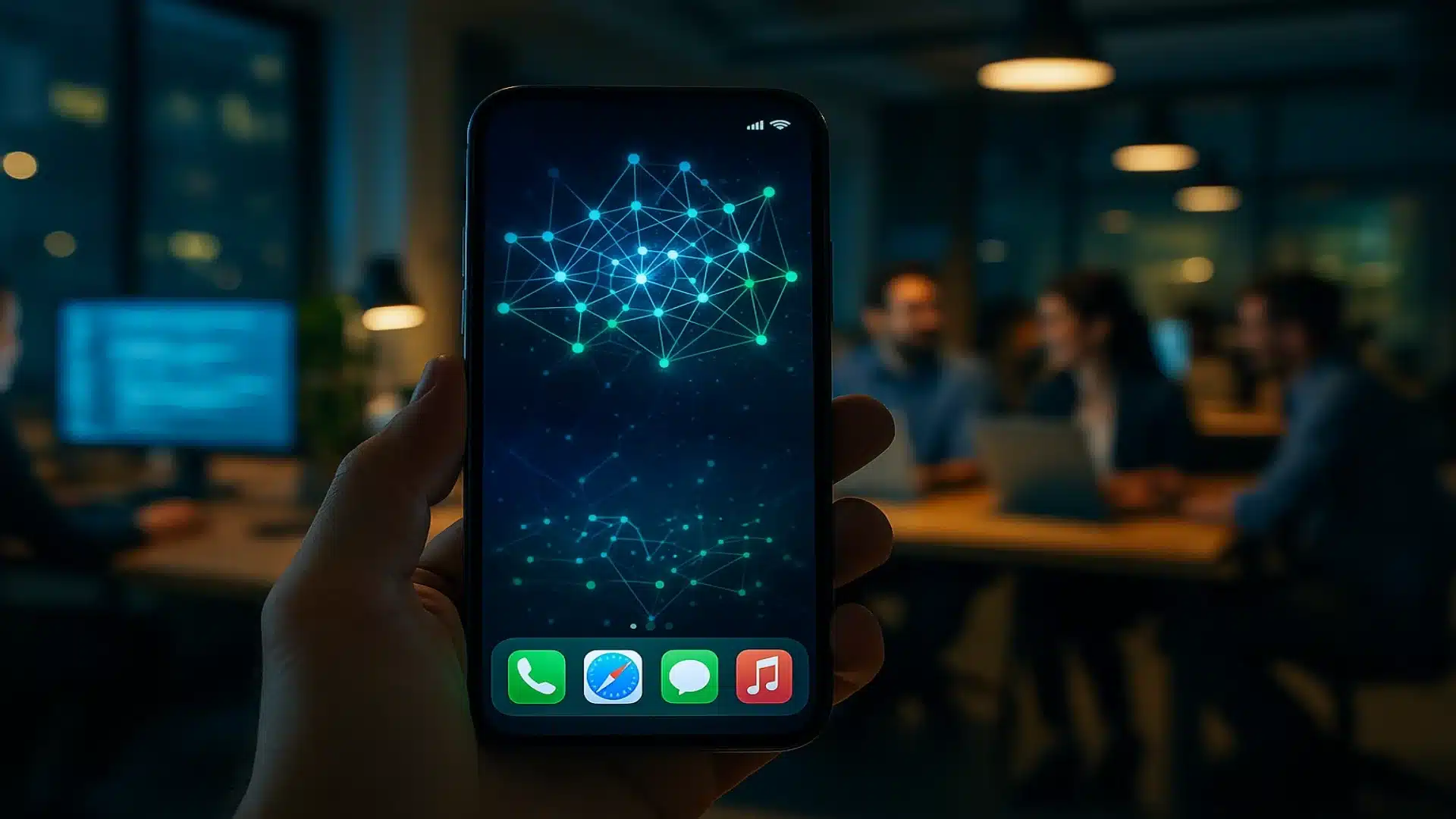Why Every New Startup Needs to Integrate AI in Mobile Apps Now

AI Generated. Credit: ChatGPT
Table of Contents
- Why AI Integration Is No Longer Optional for Startups
- Key Benefits of Using AI in Mobile Apps
- Real-World Examples of Startups Using AI in Mobile Apps
- How to Integrate AI into Your Startup’s Mobile App
- Challenges Startups Face When Adopting AI
- The Future of AI in Mobile Apps
- Conclusion
The world of technology is experiencing a huge and exciting shift wherein the smart integration of artificial intelligence into mobile applications lies at the heart. It is no longer about futuristic technologies; it is the significant engine that transforms the look, feel, and function of the mobile apps for every user.
Think about it: AI already drives everything from hyper-personalization feeds to customer service that actually solves problems, in turn driving deeper engagement with superior efficiency across the board.
For any startup launching a product today, attempting to ignore this key trend isn’t just risky; it’s practically a guaranteed recipe for immediate obsolescence.
Why AI Integration Is No Longer Optional for Startups
The marketplace has fundamentally changed in recent years, making smart technology integration absolutely necessary. Today’s startups face incredibly fierce competition, dealing with highly demanding users who expect instant, intelligent responses from their technology, meaning mobile app AI integration is a requirement for survival.
Growing competition and user expectations
We have all become accustomed to sophisticated intelligence from market leaders such as Netflix and Amazon. As such, today’s users expect every application to understand their unique needs, anticipate preferences, and offer experiences that feel personally relevant. If your app feels generic, users won’t hesitate to switch to a competitor using AI for mobile apps to deliver that seamless experience.
Role of data-driven decision-making
Data-driven decision-making plays a very important role herein. Guessing games just don’t work in business. AI is the indispensable mechanism for effective data analysis, enabling lean startups to move beyond simple statistics and perform sophisticated analysis for deep insights into user behaviors, predict who may leave, and strategically optimize features. Strategic growth requires intelligent data processing.
Custom AI Software Development Solution For Enterprises
Examples of startups already leveraging AI
We see it across every sector, from FinTech, which uses AI for automated loan scoring, to HealthTech, which uses the technology to create personalized wellness programs. These companies are building competitive advantages that are incredibly hard to beat, proving that leveraging AI is the path to rapid, defensible growth.
Key Benefits of Using AI in Mobile Apps
Integrating AI delivers immediate and measurable value across the entire application lifecycle, and these key advantages of AI in mobile apps have direct effects on growth, user retention, and long-term profitability.
Personalized User Experience
That is where AI comes into play, as it’s absolutely key to moving past generic user interfaces. AI continuously analyzes real-time user data, including past behavior, location, and even the time of day, to tailor the content, the results that pop up, or the chatbot response in an instant. This hyper-personalization enhances loyalty and creates dedicated users from casual visitors.
Automation & Efficiency
Efficiency is crucially important for survival if you are a startup, since every minute and dollar counts. AI steps in by automating such repetitive tasks that need manual attention and traditionally consume employee hours.
This includes automating the preliminary responses of customer service, intelligent routing of support tickets, and even the generation of routine code snippets. This crucial reduction in manual effort drastically improves the productivity of teams and naturally lowers operating costs.
Predictive Analytics
Imagine having that crystal ball for business; this is AI. By analyzing behavioral patterns, predictive models forecast when users will churn, what features they’ll want next month, or how market shifts might affect demand.
This forward-looking capability allows you to strategically invest resources where they will yield the highest, most timely return.
Enhanced Security
In this present-day digital landscape, security becomes the top priority. AI excels at constantly monitoring network traffic for subtle anomalies that signal fraud or a data breach attempt.
Since it learns normal behavior patterns, it becomes highly effective in the detection of sophisticated fraud and the protection of sensitive user data against rapidly evolving cyber threats.
Real-World Examples of Startups Using AI in Mobile Apps
The success stories of mobile apps powered by AI prove that this technology is not only accessible but also incredibly scalable, even for new entrants.
Duolingo offers not only lessons but also, through AI, a completely personalized and adaptive learning curve. In turn, prediction at Uber underpins the whole system: algorithms predict demand, routes are optimized, and prices dynamically change.
Grammarly goes way beyond a simple spell check by employing sophisticated AI models that understand the context of your writing to make suggestions on tone and style.
In each one of those examples, AI was not an add-on but rather the very mechanism through which these companies could scale up much quicker and grow engagement exponentially.
We have seen this pattern time and again: AI is the technical leverage that makes the difference and enables companies to have a swift market lead.
How to Integrate AI into Your Startup’s Mobile App
Taking the first step toward mobile app AI integration can seem daunting, but it’s best approached simply and methodically.
- Begin by pinpointing areas where human effort is slowing down growth or where a truly personalized touch is missing. That’s where AI should be aimed first, focusing on common friction points like search functions or initial customer support interactions.
- Remember, you don’t have to build AI models from scratch. Startups can leverage powerful, existing platforms like TensorFlow Lite (ideal for on-device processing), Core ML, or specialized cloud-based APIs. This strategy cuts complexity and cost immediately.
- Integrate just one high-impact AI feature initially. This Minimum Viable Product (MVP) approach allows you to quickly validate the technology and gather crucial initial user data without committing major resources prematurely.
- Use the data generated by your new AI feature to measure its real performance against key business metrics. You must continuously refine the model based on this real-world usage, as the AI journey is inherently iterative.
Challenges Startups Face When Adopting AI
While the vision of an intelligent app is clear, implementation naturally comes with common obstacles.
Common obstacles
Startups commonly struggle with the “garbage in, garbage out” problem because AI models are only as good as the data they consume. Furthermore, the initial investment required for AI infrastructure and specialized talent can often seem prohibitive for early-stage companies.
Practical solutions
Practical solutions involve prioritizing data governance early on, focusing only on acquiring structured, high-quality data.
Outsourcing or partnering with AI development companies
To mitigate the steep cost and expertise gaps, smart companies often choose to outsource or software development partner with specialized development firms. This gives them access to world-class expertise, like the AI specialists at Cloudester Software, without the huge overhead of hiring a full-time, niche team.
The Future of AI in Mobile Apps
The evolution of the AI mobile app startup is only accelerating. Keep an eye on these emerging trends, as they will undoubtedly define the next decade of mobile innovation.
Emerging trends: voice assistants, generative AI, edge AI.
In the future, apps won’t just recommend; they actually will generate custom content, personalized graphics, or even bits of code on the fly using Generative AI. Running models directly on the user’s mobile device, Edge AI will reduce latency and further improve privacy. We’re also moving rapidly toward sophisticated, context-aware voice and text assistants.
How AI will define the next decade of mobile innovation.
AI will not just add new features. It will completely redefine user interfaces and experiences. This transformation will make AI the key driver of mobile success.
Also read: Why Your Startup Needs a Reliable Software Development Company to Thrive
Conclusion
The takeaway here is straightforward and powerful: AI in Mobile Apps is the absolute non-negotiable foundation for competitive advantage today. From enhancing security to delivering hyper-personalized experiences, the intelligent features in mobile apps provide tangible results that accelerate growth.
Don’t let your application become yesterday’s news by resisting this shift; embrace the intelligent future now.









